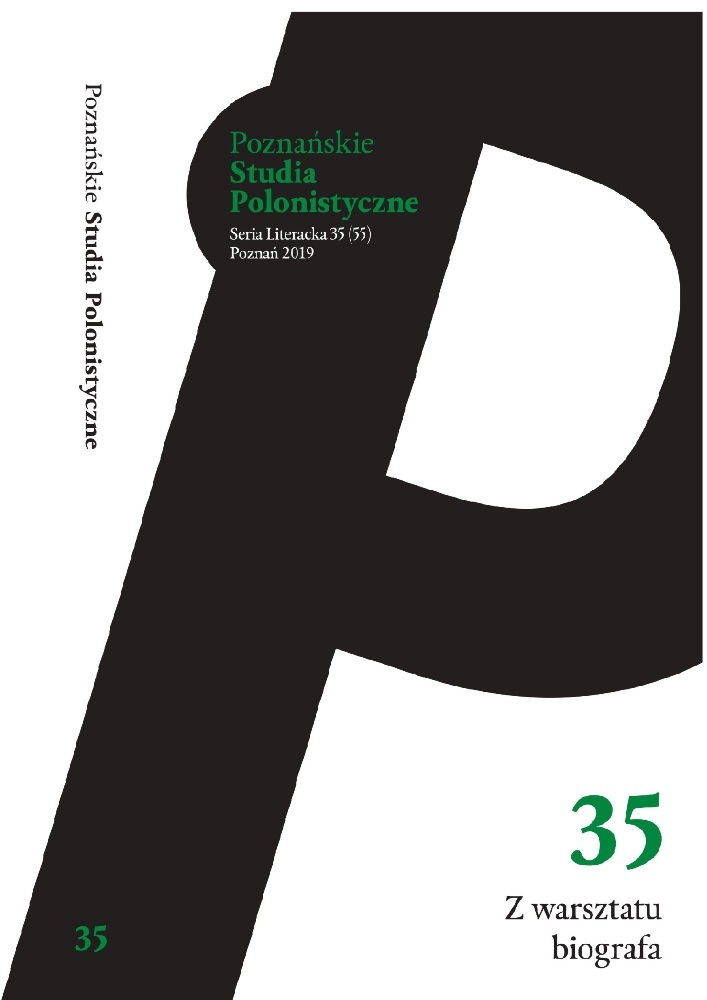Abstract
Perversions of the archive In the article, the author discusses the problematic status of an archival document,
taking into account the concepts of perverse historiography and the methodological indicators of the apartheid archive. Documents stored in IPN (Institute of National Remembrance) have been used to show the challenges faced by the people investigating the documents stored there and attempting to unify the material found in the archive. The analysis of Autor Solaris, a 2016 biographical documentary film about Stanisław Lem, is preceded by reflections on the involvement of the archive researchers in politics and their reproductions of clichés and stereotypes about the past, which the author sees as directly leading to blurring and erasing of the victims’ testimonies. In doing so, the author uses critical analyses of the pornographic aspects of the presentation of mass murder victims. Relating to a concept proposed by one of the critics indicating that using archival sources in modern art leads to a mass amnesia, the author points to the
dangers of using Nazi propaganda films in contemporary documentary film.
References
Aldrich Robert, red. (2009), Geje i lesbijki. Życie i kultura, przeł. Piotr Nowakowski, Universitas, Kraków.
Autor Solaris (2018), [online], [dostęp: 15 kwietnia 2019], https://www.filmweb.pl/film/Autor+Solaris-2016-774662/descs.
Leezenberg Michiel (2012), Book reviews: ‘The Historiographic Perversion’, „Journal of Genocide Research”, vol. 14, s. 244-247.
Lem Stanisław (2013), List z 7 grudnia 1972 roku, w: Stanisław Lem, Tomasz Lem, Sława i fortuna. Listy do Michaela Kandla 1972-1987, przeł. Jerzy Jastrzębski, Wydawnictwo Literackie, Kraków, s. 109-115.
Leśniak Andrzej (2011), Gorączka archiwów w sztuce współczesnej.
Symptomy choroby i propozycja terapii, „Kultura Współczesna”, nr 4 (70), s. 100-107.
Marzec Lucyna (2017), W archiwum prywatnym, „Czas Kultury”, nr 2, s. 6-15.
Moosa Fathima (2011), In the Apartheid Archives: From Perversion to Paradox. Commentary on Paper by Gillian Straker, „Psychoanalytic Dialogues”, nr 21, s. 664-669.
Mosse George L. (1997), Nationalism and Sexuality: Respectability and Abnormal Sexuality in Modern Europe, Howard Fertig, New York [USA].
Napiórkowski Marcin (2011), Prawda archiwów, „Kultura Współczesna”, nr 4, s. 12-25.
Nichanian Marc (2009), The Historiographic Perversion, przeł. Gil Anidjar, Columbia University Press, New York [USA].
Pollack Martin (2014), Skażone krajobrazy, przeł. Karolina Niedenthal, Wydawnictwo Czarne, Wołowiec.
Tymczyszyn Agata (2009), Jacques Lacan. Pragnienie Innego, „Psychoterapia”, nr 3 (150), s. 9-19.
Ulicka Danuta (2010), Zwrot archiwalny (jak ja go widzę), „Teksty Drugie”, nr 1-2, s. 159-164.
License
Authors
Authors of texts accepted for publication in „Poznańskie Studia Polonistyczne. Seria Literacka” are required to complete, sign and return to the editor's office the Agreement for granting a royalty-free license to works with a commitment to grant a CC sub-license.
Under the agreement, the authors of texts published in „Poznańskie Studia Polonistyczne. Seria Literacka” grant the Adam Mickiewicz University in Poznań a non-exclusive, royalty-free license and authorize the use of Attribution-NoDerivatives 4.0 International (CC BY-ND 4.0)Creative Commons sub-license.
The authors retain the right to continue the free disposal of the work.
Users
Interested Internet users are entitled to use works published in „Poznańskie Studia Polonistyczne. Seria Literacka” since 2016, for non-commercial purposes only, under the following conditions:
- attribution - obligation to provide, together with the distributed work, information about the authorship, title, source (link to the original work, DOI) and the license itself.
- no derivatives - the work must be preserved in its original form, without the author's consent it is not possible to distribute the modified work, such as translations, publications, etc.
Copyrights are reserved for all texts published before 2016.
Miscellaneous
Adam Mickiewicz University in Poznań retains the right to magazines as a whole (layout, graphic form, title, cover design, logo etc.).
